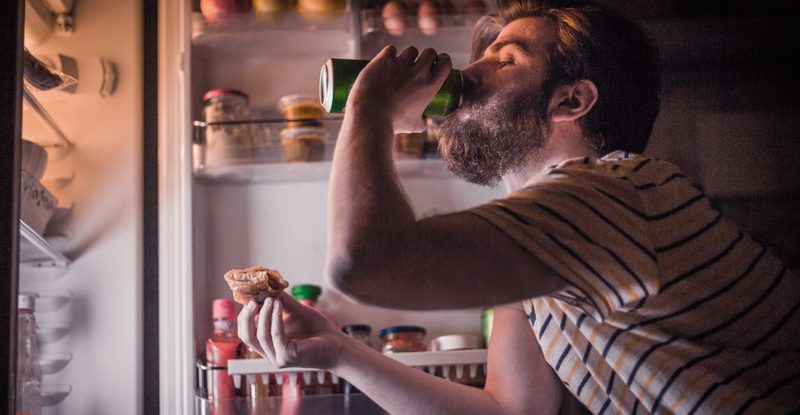Contents
Eat at night
Some people get up, sometimes every night, to go to eat; some even swallow everything they find, without being able to stop. They suffer from an eating disorder called, in English, “night eating disorder”. Sometimes designated by the term nocturnal bulimia, or nocturnal overeating, this pathology, present in 1,5% of the general population, would affect both men and women. It can reflect a metabolic problem, but it is also, frequently, of psychological origin.
What is nocturnal binge eating?
Nighttime overeating is a compulsive urge to get up to eat, during the night, without being able to curb this urge. Such a nocturnal feeding syndrome is thus characterized by bulimic compulsions, which occur during the night. Described for the first time in 1955, by Stunkard and his team, in obese patients treated in a specialized clinic, this pathology is classified by the DSM-5 (Diagnostic and Statistical Manual of Mental Disorders) in the category of eating disorders.
The main characteristic of nocturnal eating syndrome is a delay in food intake: it is usually defined as an intake of at least 25% of daily calories after dinner, or during nocturnal awakenings. Some people find themselves in a sleepwalking state, while others are on the contrary wide awake, but unable to restrain their urges to eat.
The causes of this desire to eat at night: what does it translate?
“This problem is observed especially in people who try to control their food on a voluntary basis, and who lose control in this moment of least resistance that is the night”, assures the psychiatrist and psychotherapist Gérard Apfeldorfer, interviewed by the site psychologies.com. And so, eating at night stems primarily from eating behavior control efforts to lose or not gain weight. This is what is referred to as cognitive restriction: “The person is forbidden to eat what he wants during the day, but at night, when his will is slackened, the unfulfilled desires resurface and the person eats, sometimes without realizing it, without being able to rest. always prevent ”, says the online coaching site linecoaching.com.
In fact, the prevalence of this eating disorder in the general population is approximately 1,5%. More common in patients following a clinical weight loss program, it also affects more candidates for obesity surgery, as well as patients with psychiatric disorders. It is also found in elderly patients with type 2 diabetes, people with sleep apnea or patients with restless legs syndrome.
Getting up at night can have a physical origin, like a metabolic problem: diabetes. But nocturnal binge eating can reveal a psychological problem. And indeed, mood disorders, depression, post-traumatic stress or even great anxiety can result in bouts of nocturnal bulimia. These people tend, therefore, to take refuge in food. This nocturnal bulimia is also recurrent in some insomniacs.
How to treat this nocturnal bulimia?
For psychiatrist Gérard Apfeldorfer, “If you want things to go well at night, you have to take care of your daytime life”. And thus, it is advisable to tame the food, to be able to eat everything during the day without feeling guilty. Relationship difficulties, permanent anxiety, or even a state of stress, or even depression, very often exacerbate such nocturnal compulsions: they will therefore often have to be taken into consideration during the treatment.
An effective way to achieve change in eating behavior is to follow cognitive behavioral therapy (CBT), preferably with a clinical psychologist or psychiatrist with expertise in the management of this type of disorder. In addition, a review of the literature, published in 2016 in Brazil, fairly exhaustively summarized the panel of different therapeutic solutions available to patients suffering from a nocturnal eating disorder.
In addition to CBTs, which are often successful, various non-pharmacological treatments have also been proven, including exposure to bright light in the morning, also called light therapy, as well as progressive muscle relaxation therapy.
Certain pharmacological treatments also have a positive impact on nocturnal overeating. Indeed, it could be linked to a deficiency of a neurotransmitter, called serotonin, in part of the midbrain: causing a defect in the regulation of the central nervous system, this would cause disturbances in the rhythms of sleep and ‘food. And in fact, drugs intended to increase this serotonin have shown real improvements, and in particular the reduction in nocturnal food intakes in patients treated with such molecules.
Eating is a biological activity, but also a symbolic act
The act of eating has literally restaurant effects: both at the biological level and at the symbolic level. These effects are also individual and collective – and thus, as sociologist Claude Fischer explains, after funeral ceremonies, for example, the act of eating “To give birth or to be reborn from life in oneself and in others”.
Eating at night is done in the loneliness of the night, often translating, as we have seen, psychological suffering: it tries to escape through food, which would be a form of refuge.
Finally, the prisoner of the gulag Ivan Denissovich, the zek described by Alexander Solzhenitsyn in one of his novels, would he not have found the key to a more serene relationship with food? Indeed, while Ivan Denissovich is hungry, light soup and black bread are the usual of this prisoner … We can imagine that he will devour them, voraciously. But no. He has well realized, faced with lack, that he will have to behave like a gourmet.
And so, Solzhenitsyn writes, in A Day by Ivan Denissovich: “We should have eaten thinking about it, only thinking about what we were eating, as he did, peeling off tiny pieces with his teeth, walking them under the tongue, sucking them with the inside of the cheeks, so that nothing is lost of this good moist black bread which smelled so good. “










